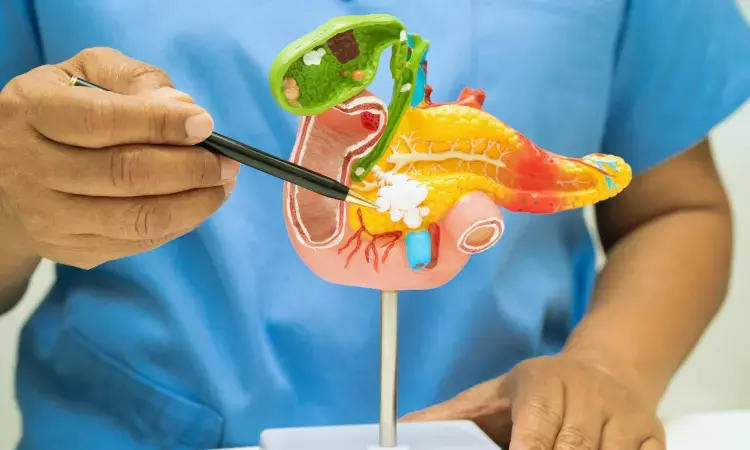- Home
- Medical news & Guidelines
- Anesthesiology
- Cardiology and CTVS
- Critical Care
- Dentistry
- Dermatology
- Diabetes and Endocrinology
- ENT
- Gastroenterology
- Medicine
- Nephrology
- Neurology
- Obstretics-Gynaecology
- Oncology
- Ophthalmology
- Orthopaedics
- Pediatrics-Neonatology
- Psychiatry
- Pulmonology
- Radiology
- Surgery
- Urology
- Laboratory Medicine
- Diet
- Nursing
- Paramedical
- Physiotherapy
- Health news
- Fact Check
- Bone Health Fact Check
- Brain Health Fact Check
- Cancer Related Fact Check
- Child Care Fact Check
- Dental and oral health fact check
- Diabetes and metabolic health fact check
- Diet and Nutrition Fact Check
- Eye and ENT Care Fact Check
- Fitness fact check
- Gut health fact check
- Heart health fact check
- Kidney health fact check
- Medical education fact check
- Men's health fact check
- Respiratory fact check
- Skin and hair care fact check
- Vaccine and Immunization fact check
- Women's health fact check
- AYUSH
- State News
- Andaman and Nicobar Islands
- Andhra Pradesh
- Arunachal Pradesh
- Assam
- Bihar
- Chandigarh
- Chattisgarh
- Dadra and Nagar Haveli
- Daman and Diu
- Delhi
- Goa
- Gujarat
- Haryana
- Himachal Pradesh
- Jammu & Kashmir
- Jharkhand
- Karnataka
- Kerala
- Ladakh
- Lakshadweep
- Madhya Pradesh
- Maharashtra
- Manipur
- Meghalaya
- Mizoram
- Nagaland
- Odisha
- Puducherry
- Punjab
- Rajasthan
- Sikkim
- Tamil Nadu
- Telangana
- Tripura
- Uttar Pradesh
- Uttrakhand
- West Bengal
- Medical Education
- Industry
Artificial intelligence accurately classifies pancreatic cysts, reveals research

Artificial intelligence (AI) models such as ChatGPT are designed to rapidly process data. Using the AI ChatGPT-4 platform to extract and analyze specific data points from the Magnetic Resonance Imaging (MRI) and computed tomography (CT) scans of patients with pancreatic cysts, researchers found near-perfect accuracy when compared directly against the manual approach of chart review performed by radiologists, according to a study published in the Journal of the American College of Surgeons (JACS).
“ChatGPT-4 is a much more efficient approach, is cost effective, and allows researchers to focus on data analysis and quality assurance rather than the process of reviewing chart after chart,” said study coauthor Kevin C. Soares, MD, MS, a hepatopancreatobiliary cancer surgeon at Memorial Sloan Kettering Cancer Center in New York City. “Our study established that this AI approach was essentially equally as accurate as the manual approach, which is the gold standard.”
Using an existing database of nearly 1,000 adult patients with pancreatic lesions under surveillance between 2010 and 2024 at Memorial Sloan Kettering Cancer Center in New York City, ChatGPT-4 was deployed to identify nine clinical variables used to monitor cyst progression: cyst size, main pancreatic duct size, number of lesions, main pancreatic duct dilation, branch duct dilation, presence of solid component, calcific lesion, pancreatic atrophy, and pancreatitis. Pancreatic cysts are common and require ongoing surveillance because some develop into cancer and require surgery.
Researchers evaluated ChatGPT-4’s ability to identify and classify these nine factors associated with increased risk for dysplasia and cancer. A manually annotated institutional cyst database was used as the standard for comparison.
Key Findings
• The study involved 3,198 unique MRI and CT scans from 991 patients under long-term surveillance for premalignant lesions.
• ChatGPT-4 successfully extracted clinical variables with high accuracy. The accuracy rate ranged from 97% for a solid component, a high-risk variable, to 99% for calcific lesions.
• Accuracy was 92% for cyst size and 97% for main pancreatic duct size, other high-risk variables that may indicate cancer and require surgical resection, biopsy, or endoscopic ultrasound.
“AI can help us expand medical research and improve patient outcomes,” Dr. Soares said. “The question I get asked most often is, ‘What is the chance that this cyst is going to develop into cancer?’ We now have an efficient way to look at the MRI and CT scans of thousands of patients and give our patients a better answer. This approach goes a long way to reduce anxiety and help patients feel more confident about their treatment decisions.”
While this was a proof-of-concept study, moving forward the study authors say they would like to use AI to expand the number of research questions they ask to enhance patient care.
“There is a lot of interest in understanding if AI can predict who is going to develop cancer. It’s important to understand who progresses and why, so we have a better chance at tailoring surveillance,” Dr. Soares said. “We want to limit the number of patient visits, costs to the health care industry, and ultimately provide a customized, rather than one-size-fits-all approach to surveillance.”
The researchers caution that the study used only one AI source, ChatGPT-4, and results are limited to the data that was used. AI can only work with the information that is handed to it. These limitations may reduce the broader applicability of the findings.
Reference:
Choubey, Ankur P MD MPH1; Eguia, Emanuel MD MS1; Hollingsworth, Alexander MS2; Chatterjee, Subrata PhD2; D’Angelica, Michael I MD1; Jarnagin, William R MD, FACS1; Wei, Alice C MD, FACS, MSc1; Schattner, Mark A MD3; Do, Richard K G MD PhD4; Soares, Kevin C MD MS1; the MSKCC Pancreas Cyst Collaborative. Data Extraction and Curation from Radiology Reports for Pancreatic Cyst Surveillance Using Large Language Models. Journal of the American College of Surgeons ():10.1097/XCS.0000000000001478, July 10, 2025. | DOI: 10.1097/XCS.0000000000001478
Dr Kamal Kant Kohli-MBBS, DTCD- a chest specialist with more than 30 years of practice and a flair for writing clinical articles, Dr Kamal Kant Kohli joined Medical Dialogues as a Chief Editor of Medical News. Besides writing articles, as an editor, he proofreads and verifies all the medical content published on Medical Dialogues including those coming from journals, studies,medical conferences,guidelines etc. Email: drkohli@medicaldialogues.in. Contact no. 011-43720751


